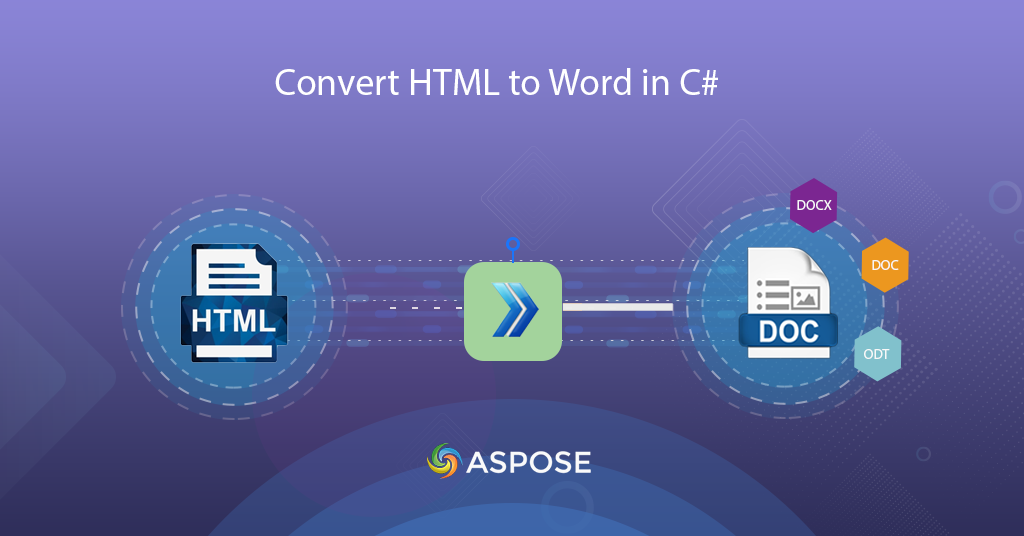
Convert HTML to Word in Java
In today’s dynamic digital landscape, the ability to seamlessly convert HTML content into Word documents (DOCX, DOC etc.) has become a vital necessity for various industries and professionals. As online communication and content creation continue to thrive, the demand for a reliable ‘HTML to Word’ conversion method has risen significantly. Whether you’re a web developer aiming to preserve the formatting of web content in a shareable Word file, a content creator looking to repurpose online articles, or a business needing to compile HTML-based reports, the need for an efficient and accurate ‘HTML to Word’ conversion solution is evident.
This article delves into the significance of converting HTML to Word using .NET Cloud SDK.
HTML to Word Conversion Cloud API
When it comes to converting HTML to Word with utmost precision and efficiency, the Aspose.Words Cloud SDK for .NET stands out as a top-tier choice. With its powerful capabilities, this SDK offers a seamless way to perform HTML to Word conversion while maintaining the integrity, structure and style of content throughout the process. Integrate the Cloud SDK into your .NET applications, and gain an access to a powerful toolkit that effortlessly translates HTML elements, images, formatting, and more into professionally formatted Word documents.
The first step is to install the .NET Cloud SDK which is available on NuGet and GitHub. Please execute the following command in the terminal window to perform the installation for NuGet:
nuget install Aspose.Words-Cloud
The next step is to create a free account by visiting Aspose.Cloud dashboard. Sign up using GitHub or Google account, or click on the Create a new Account button. Obtain your Client Credentials as they will be needed in subsequent sections.
Convert HTML to Word in C#
Please follow the instructions given below to HTML to Word conversion using C# .NET.
- Firstly, create an object of WordsApi where we pass Client ID and Client secret as arguments.
- Secondly, create an object of SaveOptionsData class where we define the output format as DOCX and the resultant file name.
- Thirdly, create an object of SaveAsRequest where we pass input HTML and SaveOptionsData objects as arguments.
- Finally, call the method SaveAs(…) which takes SaveAsRequest to convert HTML to Word.
The resultant file generated as output can be found over myResultant.docx.
HTML to DOCX using cURL Commands
The conversion of HTML to Word becomes remarkably straightforward by harnessing the combined prowess of Aspose.Words Cloud and the cURL command-line tool. Therefore, by constructing a cURL command that interacts with the Aspose.Words Cloud API, you gain the ability to process HTML files, while retaining intricate formatting, images, and styles in the resultant Word output.
As our APIs are only accessible to authorized users, so please execute the following command to generate the JWT authentication token.
Obtaining JWT token
curl -v "https://api.aspose.cloud/connect/token" \
-X POST \
-d "grant_type=client_credentials&client_id=xxxxxxx-1c8e-4ea4-a948-3857547232fa&client_secret=xxxxxx" \
-H "Content-Type: application/x-www-form-urlencoded" \
-H "Accpet: application/json"
Once the JWT token is generated, please execute the following command to convert HTML to DOCX format.
curl -X PUT "https://api.aspose.cloud/v4.0/words/EmptyHtmlFile.html/saveAs" \
-H "accept: application/json" \
-H "Authorization: Bearer <JWT TOken>" \
-H "Content-Type: application/json" \
-d "{\"SaveFormat\":\"docx\",\"FileName\":\"myResultant.docx\",\"ZipOutput\":false,\"UpdateLastSavedTimeProperty\":true,\"UpdateSdtContent\":true,\"UpdateFields\":true,\"Dml3DEffectsRenderingMode\":\"Basic\",\"UpdateLastPrintedProperty\":true}"
Conclusion
In conclusion, the process of converting HTML to Word documents is no longer a complex and time-consuming endeavor, thanks to the integration of Aspose.Words Cloud and the versatile cURL command-line tool. This dynamic partnership empowers individuals and developers to effortlessly translate HTML content into professionally structured Word files, maintaining the essence and integrity of the original content.
Whether you prefer the flexibility of using a cloud-based SDK or the command-line convenience of cURL, both options enable you to streamline content repurposing, enhance collaboration, or optimize document workflows, this combination provides a reliable and efficient solution.
- In case you encounter any issues while using our API, please feel free to contact us via free support forums.
Related Articles
We highly recommend visiting the following links to learn more about: